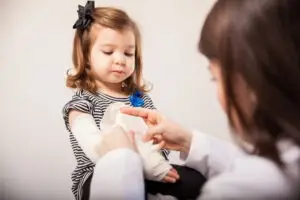
One could argue that harming a kid, or child abuse, is the worst crime an individual can commit. However, under the scope of the law, not all injuries to a child are necessarily physical. Injury to a child by omission is when the child’s legal guardian fails to appropriately respond to prevent an injury. In other words, child neglect can be constituted as injury to a minor, and there are substantial legal repercussions for it.
Neglecting a Child
One can be held liable for the physical harm of a child even if they were not the direct cause of it. This is because the most likely reason why the child got injured is due to not being properly watched and taken care of. These kinds of crimes, although heartbreaking to hear about, happen way more often than you would think.
According to the Centers for Disease Control and Prevention (CDC), in its latest year of reporting, 1 in 7 children were found to have been abused or neglected. This is likely an underestimate due to the fact that many child neglect cases go unreported. This staggering statistic includes injury to a child by omission.
If a kid goes hungry, it is their parent or legal guardian’s fault for not feeding them. If a child is beaten by one of their parents, the other parent can be found liable for turning a blind eye to it. The actual physical abuser of the child will be held criminally liable for more damages.
However, the other parent or legal guardian can face serious consequences as well for failing to prevent the abuse. Reach out to one of our well-trained child injury lawyers at Shelly Leeke if you suspect your child may be the victim of abuse by another adult who knows better.

Bodily Injury vs Serious Bodily Injury
Penalties for child neglect vary depending on the circumstances of the suspected crime. Child neglect charges can range from a misdemeanor to a third-degree felony to a first-degree felony. The charges can be categorized as bodily injury or serious bodily injury.
The difference between the two is that boldly injury did not put the child’s life at risk, while serious bodily injury does put the child’s life in danger. According to Title 63 of the South Carolina Children’s Code, a child abuser can be convicted of a first-degree felony and face 5 to 99 years in prison if the court finds that they knowingly and purposely harmed the child.
Punishments for Injury to a Child by Omission
Child abusers can be convicted of a second-degree felony and face up to 20 years in prison if they were found to have engaged in reckless conduct that resulted in a kid getting seriously hurt. Someone accused of child abuse can face up to 2 years in prison, along with paying a hefty amount in fines, if they were found to have been criminally neglectful.
There are also life-long consequences for being found guilty of child abuse. The abuser will have their name added to a child abuse registry and this, in turn, can have a damaging effect on other aspects of their life.
Child abusers will find it more difficult to get approved for decent housing, bank loans, and being able to purchase a gun. Getting hired at a decent job will also become quite challenging, not to mention the fact that their reputation in their community is forever tarnished.
How Is Child Neglect First Reported?
Someone close to the accused abuser, maybe a family member or concerned neighbor, might call the police to officially report suspicions of child abuse or child neglect. From there, the Department of Social Services (DSS) will begin a formal investigation into the family.
The very first thing the DSS agent will do is determine whether or not the child (or children) needs to be put into emergency protective custody or if it is safe for them to remain at home with their legal guardian(s) for the time being. Children remaining at home with the accused abusive parents leads to a court hearing with a family judge to determine the nature of the case and the safety and well-being of the child.

Affirmative Defenses to Child Neglect
Child abuse cases are both criminal and civil cases, which means that for the criminal case, the burden of proof is beyond any reasonable doubt. In contrast, the burden of proof for a civil case is a preponderance of the evidence. Even though the two cases are not directly related, the outcome of the criminal case can affect the civil case.
Someone suspected of child abuse might use a variety of different affirmative defenses to clear their name. These affirmative defenses from the defendant include that they:
- Notified the Department of Protective and Regulatory Services that they would no longer provide care to the child before the offense occurred.
- Provided medical care as indicated by a licensed doctor (like giving a child their required prescription drugs)
- Performing emergency medical services despite not being a medical professional (like engaging in CPR if the kid was not breathing)
- Failed to report the incident of their child’s injuries if there is no evidence that they knew about the injuries
When hiring a child injury lawyer from Shelly Leeke to sue someone for injury to a child by omission, it is important to understand how they might defend themselves. Our team of talented attorneys has all the knowledge and experience we need to properly prepare to fight against these types of defense arguments.

Impacts on the Child
Child abuse and child neglect can have life-long impacts on the victim(s). Most notably, children of abusive or neglectful parents can develop emotional and psychological problems like anxiety, depression, and post-traumatic stress disorder (PTSD). As the children grow older, they are at increased risk for other dangers. This includes future violence victimization and perpetration, alcohol abuse, drug abuse, sexually transmitted infections, stagnated brain development, lower educational attainment, and limited employment opportunities.
Hiring a child injury attorney today for a kid who you suspect is being abused or neglected can help prevent all of these terrible outcomes from happening. Contact Shelly Leeke as soon as you can and receive a free and confidential consultation.







